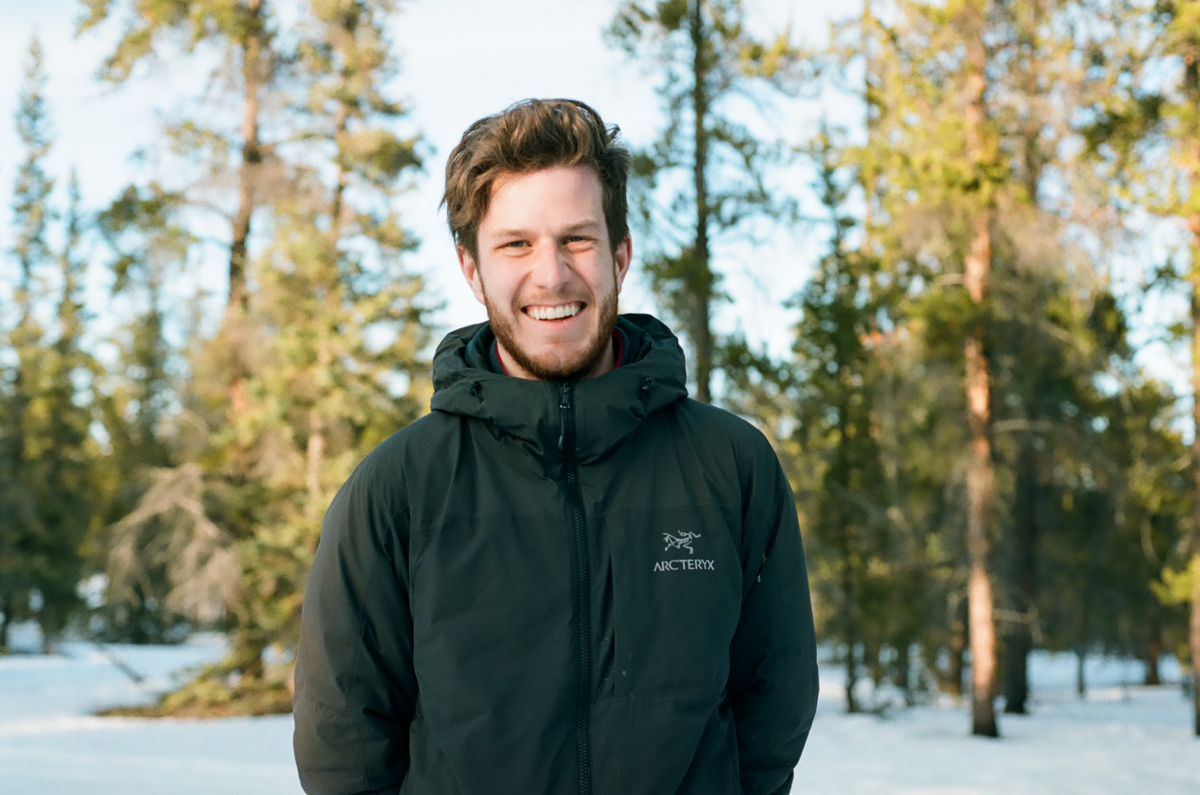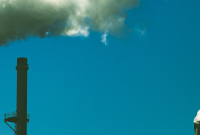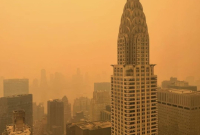Support strong Canadian climate journalism for 2025
I didn’t see it coming.
Despite shut windows, months-long wildfire smoke-induced, low-grade headaches and grey sky sadness, I never thought we would evacuate. The fire jumped the last firebreak, 30 kilometres away, moving towards the city of Yellowknife at 10 kilometres per day.
Only then did I pay attention.
I slammed my laptop shut and packed an evacuation kit: water, chainsaw, granola bars — what else? COVID taught us the value of supply chains. I loaded up on groceries, thinking planes would be grounded by smoke and our only highway out of town closed — wildfires burning on both sides. I bought hoses, a water pump. I never thought we would be told to evacuate 48 hours later.
We made it out — most of us displaced more than 1,500 kilometres away for three weeks, including a 100-bed hospital — and we eventually made it back home.
And now I am on the move again.
This time leaving the country at the end of the month for a job in Singapore because, despite all of this, Canada is lagging in decarbonizing and climate-proofing our health-care systems — like building net-zero hospitals powered by wind and solar, reducing the use of single-use items in clinical settings, and equipping our operating rooms with air purifiers so surgeries don’t have to be paused during wildfire smoke events. I would prefer to do this work here, but I can’t just sit and wait while Canada hums and ahs about how to get started.
Climate insomnia and snow-free Christmases
My boots got wet while skiing across the lake last week. Not frozen yet. At the same time last year, the ice road was open already. Keeps me up at night.
Climate-induced insomnia, or "the crazy lady of the house" as my grandma calls it, has been haunting me at 2 a.m. for a decade. Following my psychologist’s advice, I sought a career in climate change mitigation. Makes sense: “Action alleviates anxiety,” says Dr. Courtney Howard, a leading climate and health advocate and emergency room physician in Canada.
After engineering school, I found my niche in decarbonizing health care. Health-care systems depend on intact supply chains, infrastructure and a robust workforce. You need epinephrine in stock when treating anaphylactic shock or cardiac arrest, even if a tornado destroys the plant where drugs are manufactured or roads to get there are flooded.
Global warming's got talent: Canada falling behind
Health care accounts for about five per cent of global emissions — more than aviation — and allocates about 10 per cent of global world product, meaning its buying power can decarbonize other sectors. More importantly, what doctors and nurses do matters to us. According to various Ipsos surveys, the public trusts them more than engineers, judges, scientists — and politicians. Nurses get stuff done. Let’s give them the power to decarbonize health care — and by virtue of their influence — our communities as well.
Now, with a high-level and exciting opportunity to lead the implementation of health-care decarbonization at the National University of Singapore's School of Medicine, I am bittersweet about leaving home to protect our frozen lakes. Why can’t I do this here?
Countries like the U.K. and Singapore are taking health-care decarbonization seriously: they have solid, well-funded, and well-staffed plans to deliver on net-zero goals. Canada hasn’t even officially baselined our national health-care emissions.
We committed to the WHO climate-resilient and low-carbon health systems initiative, but have not allocated the resources we need to deliver on our goals, leaving a tiny team at Health Canada and scattered academic and provincial initiatives to muddle along. So, off I go.
A stint in green and beautiful Singapore will be fun — and I am grateful to be part of this ambitious project — but home for me is skiing in the forest, canoe trips and sleeping on spruce boughs.
Saving money
Climate change is the 21st century's greatest health threat. It will increase the need for health care, and related emissions: more asthma inhalers, more hospitals evacuated on federal Hercules. But solutions exist.
Reducing waste in hospitals. Replacing standard asthma inhalers with dry powder inhalers, a greener option with similar patient outcomes. Grouping multiple care appointments instead of flying patients twice. These are all no-regret moves that save money. Also: patient-centred telehealth integrated into team-based care. The U.K. health system has eliminated more than 30 per cent of its emissions, and they already have zero-emission ambulances.
Harnessing our national buying powers for greener health-care procurement reduces costs. Fortifying health care against climate threats is vital: asthma, tick-borne diseases, displacements, heat waves. Better air filtration in all public buildings is a twofer, protecting against respiratory viruses and wildfire smoke, helping to offload our overwhelmed ERs.
This federal government successfully delivered a National Adaptation Strategy and now has two sprints: filter action items from the national strategy down to the front line, and develop a national mitigation strategy with the provinces and territories. Smoke from zombie fires rises beside the highways leading to the North even now — we need to prepare for another summer of extreme wildfires. Most health-care practitioners have never been briefed on air pollution or climate change. Our front line isn’t ready.
The evacuation was stressful, but preparing my kit was comforting: “I am ready.” In my work with Doctors Without Borders, I saw makeshift hospitals in Sierra Leone, Uganda and South Sudan, often due to climate-amplified displacements and famines. But I never thought I would be displaced by climate impacts myself. I’d like to protect, reinforce and decarbonize the health-care system we have and be able to say: “We are ready.”
William Gagnon works on health-care systems decarbonization. He obtained a bachelor's in building engineering (Concordia 2017) and a master’s of science in bioresource engineering (McGill 2023). He is an expert on green buildings (Accredited Professional in Leadership in Energy and Environmental Design), and health-care systems decarbonization.






Comments